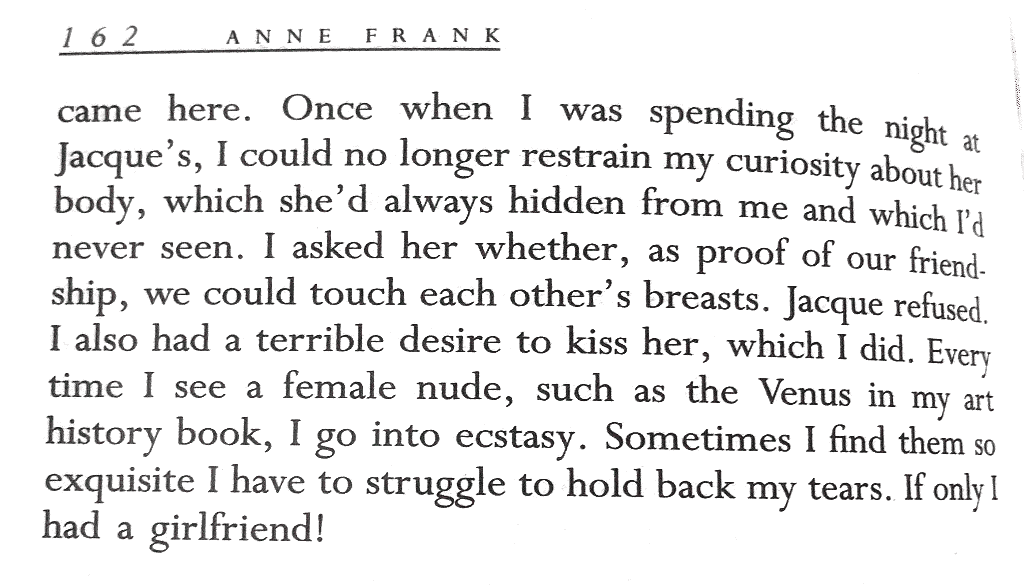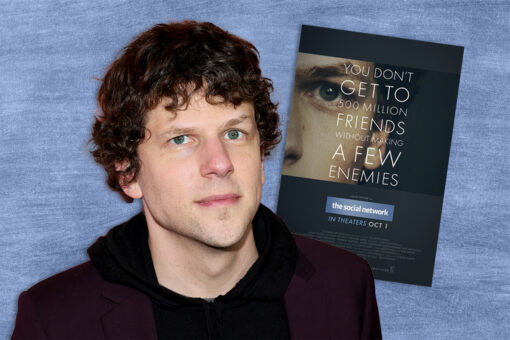With another Pride month come and gone, I’ve had the always upsetting experience of scrolling through social media and encountering post upon post of people declaring that Anne Frank is their bisexual icon. Yes, it’s become somewhat of a trend for people to share excerpts from the teenage Holocaust victim’s diary, all the while lamenting the fact that her father omitted certain diary entries before publication that mention her feelings towards boys and girls.
But I’m here to tell you: Anne Frank never has — and never will be — your bisexual icon. Please stop calling her that.
It’s hard not to talk about Anne Frank when you talk about the Holocaust. Her diary, published in 1947, is arguably the defining piece of Holocaust literature. Thanks to the popularity of her diary, we know how Anne and her family hid in a secret annex for 761 days trying to evade Nazi capture. We know her innermost thoughts and teenage angst. We know that her diary abruptly ended after an unknown person betrayed those hiding in the annex and alerted the Nazis.
We know past her diary, too: We know Anne, her mother, and her sister were imprisoned in Auschwitz and later transported to Bergen-Belsen. There, Anne and her sister contracted typhus and both died within a few days of each other — just a few weeks before liberation — and their bodies were thrown into a mass grave that was then set alight. It was 1945. She was 15 years old.
Back in the annex, Miep Gies, the Dutch citizen who helped the Frank family stay hidden, had taken Anne’s loose notes and diary and put it away for safekeeping. When Anne’s father, Otto, returned after the war, he discovered that he was the sole survivor out of his family. There, Gies returned Anne’s diary to him. Knowing that it had always been Anne’s dream to be a famous writer, Otto decided to try and publish it. The rest is quite literally history.
Throughout the war, Anne revised and edited parts of her diary, either to explain things more clearly or to omit petty details that she thought were no longer relevant. She hoped that after surviving the war, she’d be able to share her diary as testimony. To historians, Anne’s unedited diary is known as version A. Her revised diary is known as Version B. When Otto was trying to decide what exactly he should publish, he used a mixture of both Version A and B.
When going through the diary ahead of publication, Otto himself chose to omit certain paragraphs and ideas. For example, he cut several unflattering paragraphs that Anne had written about her mother, with whom she had a strained relationship. Out of respect to his wife and to Anne, the grieving Otto did not think that that was something to be published.
This brings us to Anne’s supposed bisexuality. As a young girl going through puberty, Anne wrote quite a bit about her thoughts on becoming a woman, her fascination with childbirth and sex, and her exploration of her genitalia. At the time, any open discussion of one’s sexuality and sexual identity was strictly taboo. But here was Anne writing about her desire to explore romance with a woman, including a “wish for a girlfriend.”
Otto realized two things: One, Anne would probably be mortified if those excerpts were published, and two, he believed that no publisher would ever agree to publish the diary with such explicit and taboo details, anyway. He made the logical and respectful decision at the time and chose to omit these parts. When asked about his decision years later, he replied, “Of course Anne didn’t want certain things to be published. I have evidence of it… Anne’s diary is for me a testament. I must work in her sense. So I decided how to do it through thinking how Anne would have done it. Probably she would have completed it as I did for a publisher.”
When the uncensored version of her diary was published in 1995, and the paragraph below in particular came to light, many people began to speculate over Anne’s sexuality, the very thing that Otto did not want.

In recent years, many have decided that this omission is reason to attack Otto for being a misogynist and “purposely trying to erase Anne’s sexuality” in what is, in the words of a literal Tumblr post, “typical cis male behavior.” While the original post has been deleted, a plethora of similar sentiments have remained. I even saw one Twitter thread explaining that, due to Otto’s “act of misogyny,” this person was made “uncomfortable enough to boycott the book.”
That is repulsive.
Otto lost his entire family, his life, and everything he ever knew during the Holocaust. He was beside himself with grief; yet, he soldiered on because he knew the impact that his daughter’s diary would eventually have. He chose to respect her and what remained of her privacy during a period where such revelations would be damning and mortifying. He understood that in order for Anne’s story to change the world, he’d have to leave out this detail in order for a single copy to be published.
To an extent, I understand the speculation. It’s only natural that we seek out people in history who were just like us. The fact that they’re historical figures makes it even more meaningful because it gives us the feeling of knowing that even all those years ago, these people also felt the same way. Virginia Woolf was bisexual? Wow! That makes me feel so validated to know that someone born more than a century ago whose work I admire felt the same way I do. Greta Garbo? Josephine Baker? Oscar Wilde? Freddie Mercury? Amazing. Bisexual historical figures have been around for centuries upon centuries, from ancient Greece to the famed 18th century icon Casanova all the way to the present day, and to know this leaves such an affirming feeling of solidarity, of knowing that I’m not alone in this. I know these feelings: I know the euphoria that runs through you when you discover another famous figure just like you.
But with regard to Anne Frank, it is unacceptable.
Anne was 15. She was a minor who should have had a lifetime to explore her feelings. Speculating over a minor’s sexuality — no matter who they are! — is predatory behavior, especially when said minor is in no position to comment. Labeling Anne without her consent is disgracing her memory and leaves us Jews with the bitter feeling that some people only care about us and our history when it fits a certain narrative.
Anne was many things: a writer, a victim of the Holocaust, a teenager, a Jew. She remains an inspiration to countless people. Her sexual identity — bisexual or otherwise — is not the part of her story that anyone should be focusing on. Focus instead on the horrible time that she spent hiding in a cramped annex with hostile people. Focus on the betrayal she experienced, on the suffering she was subjected to, and her eventual death. Focus on the fact that the only reason she went through this was because she was born a Jew. Focus on the fact that Anne’s story was cut short before even she could know who she truly was.



